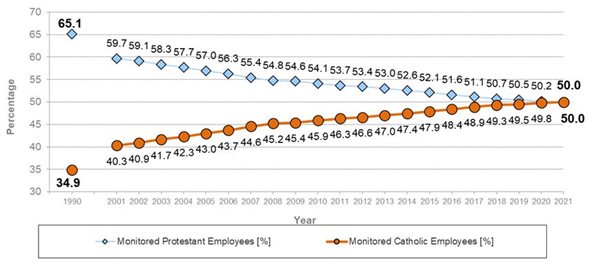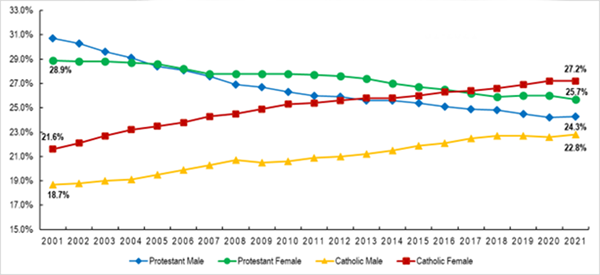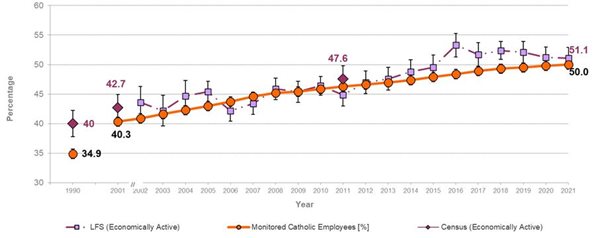32nd Fair Employment Monitoring Report published

21/04/2023
Equality Commission press release
Speaking today on the publication of the 32nd Fair Employment Monitoring Report, Geraldine McGahey, Chief Commissioner, Equality Commission for Northern Ireland said: “The Fair Employment legislation paved the way for the Belfast-Good Friday Agreement by bearing down on discrimination and inequality and making significant inroads into what was seen previously as an impossible barrier to political and economic progress.
“Northern Ireland’s workforce composition as shown in this report is very different to what we saw 30 years ago. The Fair Employment legislation was responsible for driving that change, and for proving that legal enforcement of rights could work.”
This latest report shows the breakdown of the monitored workforce in Northern Ireland by community background. It uses data provided to the Commission by private and public sector employers based on their workforces in 2021. The total monitored workforce was 564,296. Of that total, 245,419 (43.5%) were Protestant, 245,070 (43.4%) were Roman Catholic, and 73,807 (13.1%) were Non-Determined.
Women made up (52.4%) of the monitored workforce, a slight drop by 0.5% from the previous year (52.94%).
Ms McGahey further commented: “We have had fairer participation in workplaces for some years, reflecting the figures on people in the community available to work.
“One of the most noticeable trends is the increasing number of non-determined employees. Our society is changing, so inevitably the workforce will change too. The Commission is focusing on the need for law reform, including a Single Equality Act, but it’s important that we proceed with caution. Any new legislation should build on the unique and highly successful fair employment provisions. It should be seen as a chance to strengthen and enhance the laws that have worked so well to make our workplaces less divided, more inclusive, and more accepting of difference.
“Fair Employment legislation could never have worked without the efforts of employers and trade unions who made a commitment to equality, sometimes in very difficult circumstances. We thank employers for the work they do to collect and share fair employment information, especially in the period under review when the pandemic was still raging.”
Full details of the
32nd Fair Employment Monitoring report (2021) are available on our website
Key findings
Employment Stocks:
- In 2021, for the first time since monitoring began the share of the total monitored workforce from members of the Protestant community was [50.0%] and members of the Roman Catholic community [50.0%].
- In 2021, the Roman Catholic community composition of the monitored workforce was 1.1 pp lower than the broad approximation of Roman Catholics available for work. The Roman Catholic community composition of the monitored workforce once again approximates estimates of those available for work as taken from the Labour Force Survey.
Employment Flows:
- For the thirteenth consecutive year, the Roman Catholic community [52.8%] comprised a greater proportion of applicants than the Protestant community [47.2%].
- In every year since 2006, members of the Roman Catholic community [52.7%] comprised a greater proportion of appointees than did the Protestant community [47.3%]. In 2021, the Roman Catholic community share decreased by 0.7 percentage points from the previous year. Overall their share has increased by [7.9 pp] from [44.8%] in 2001.
- In 2021, the Roman Catholic community [51.3%] comprised a greater proportion of leavers than did the Protestant community [48.7%]. Overall, the Protestant community share of leavers has decreased by [7.1 pp] from [55.8%] in 2001.
Composition of the monitored workforce over time (since 2001, with 1990 data for illustrative purposes)

Monitored NI Workforce all employees [%] by Community Background and Sex 2001-2021

Roman Catholic composition of the monitored workforce over time, compared to the estimated Roman Catholic composition of the Economically Active since 2001 (1990 data for illustrative purposes)
 print or view this article in pdf format
print or view this article in pdf format